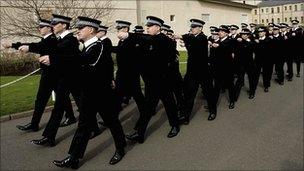Counting the cost of Scottish budget cuts
- Published

Scottish councils have already announced 12,000 job cuts over the next few years
More than 1,000 job losses, cuts in services and increasing charges.
There are the steps which could be in store over the next few years at the latest Scottish council to bring forward proposals for belt-tightening.
North Lanarkshire anticipates finding £55m worth of savings in just two years.
In addition to the potential job losses, the council is set to discuss options such as raising charges at lunch clubs, reducing the school breakfast service and cutting the number of school pupils who are entitled to free transport.
But the tough choices facing the authority are likely to be mirrored at all of Scotland's 32 councils.
Local authorities play a vital role in the delivery of public services but are bracing themselves for big cuts over the next few years.
Block grant
Education, libraries and social work are entrusted to councils.
They play a part in delivering public transport and are responsible for maintaining local roads.
Many are also responsible for galleries, museums and recreational facilities.
They also play a part in funding emergency services.
The majority of council funding is determined through a chain which stretches from town halls to Holyrood and then to Westminster.
The Scottish government currently lives off a block grant from Westminster, which is calculated using a method dating back to the 1970s - the Barnett Formula.
Essentially this means any increases or cuts in expenditure have a proportionate impact on the total amount of money the Scottish government receives from Westminster.
However, the Scottish government is not mandated to spend the money in a particular way.
So a cut or a rise in, say, the amount spent on education south of the border might have an effect on the Scottish government's total budget - but any changes to the amount spent on education in Scotland would be the Scottish government's decision alone.
Until the Comprehensive Spending Review, the Scottish government cannot say with certainty how much money it will have to spend next year - or how much it can give to local authorities.
Until then, discussions about cuts from 2011 are to some extent academic as they are based on budget predictions.
The reality could prove different.
As a rule of thumb, councils get about 80% of their money from the government and the rest comes from the council tax, although the exact proportions vary from area to area.
There are two big issues for local authorities - the extent of the cuts and savings they may have to make and whether the council tax freeze can continue for another year.
The Scottish government is very proud of the national council tax freeze which it says has brought relief to a lot of families in difficult financial times.
Wage bill
It used a carrot and stick approach - the carrot was that councils got more money from the government every year but the stick was that councils would lose the cash if they put up the council tax.
Last month the leader of Glasgow City Council, Gordon Matheson, said councils should be able to raise the council tax again without losing government money.
Some other council leaders expressed some sympathy with this argument. Government ministers haven't ruled out lifting the council tax freeze as part of next year's budget, although they had previously expressed an aspiration to try to freeze it for a fourth year.
However, councils are still expecting to make massive savings.
The biggest single cost they can control is the wage bill and efforts are already under way to keep it in check.
Councils have already announced about 12,000 job cuts over the next few years.
The total is widely expected to reach double that number.
Meanwhile, the bulk of council staff are facing a two-year pay freeze from 2011 and a rise of just 0.65% this year, backdated to April.
The Scottish council umbrella body, Cosla, last month imposed a three-year pay deal on about 150,000 council workers, which was significantly poorer than the one union members had earlier voted to reject.
Involve business
However, a combination of a pay freeze and any rise in the council tax will not be enough to prevent cuts.
Local authorities argue they have already tried to become more efficient.
Some have already reined in spending to concentrate on their statutory obligations at the expense of other projects which they knew to be worthwhile.
More details of budget proposals for next year around Scotland are likely to start emerging in the weeks ahead, although decisions are unlikely to be taken for several months.
In the short-term, the likelihood is a combination of cuts and closures along with charges for services which are currently free.
Other options may emerge, including putting services out to tender to drive down costs or looking to provide services in different ways - possibly by trying to involve businesses, charities or community groups.

The number of officers could fall by 2,808, according to the Scottish Police Federation
For instance, Glasgow - Scotland's largest council - recently warned that cuts in spending will be "harder, faster and deeper" than it had originally expected.
Glasgow City Council said it would have to find £40m more in savings than it had planned for next year.
The authority now expects to have to save a total of £115m between 2011 and 2013. The council is also well on the way to cutting 2,800 jobs.
Away from councils, police funding is also becoming a hot issue.
Last week Strathclyde Police asked for volunteers for redundancy amongst its civilian staff and warned it would have about 200 fewer officers by April, as those who retire are not replaced.
Nationally, the Scottish Police Federation (SPF) is warning that potential budget cuts over the next year could be equivalent to cutting 2808 police officers - almost one in six.
It claims that in some areas the number of police officers could fall back to levels last seen in the mid 90s.
The public sector makes up a larger proportion of Scotland's economy than England's.
Some economists and business figures have long been concerned by this.
Indeed, the size of Scotland's public sector has also led to worries that spending cuts could have a damaging effect on Scotland's wider economic well-being.
While critics want some parts of Scotland's public sector cut down to size, the concern is that some cuts would simply be short-term solutions to balance budgets rather than part of a move to reshape the economy or the delivery of public services.
Come October, a clearer idea of just what will happen from next April onwards will start to emerge.
- Published7 September 2010
- Published26 August 2010
- Published3 August 2010